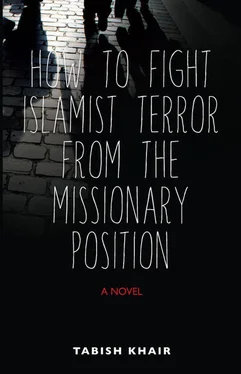Mr. Hansen had moments of doubt in the reinforced bathroom, though the police took only seven minutes to arrive. He was mostly worried about his grandchildren. He hoped the anti-terror experts were right when they told him that Islamists never attacked family members of their chosen targets. In any case, he knew he was too old to fight a young man armed with a knife and an axe. As he still held one of the sandwiches he had wrapped, he sat down on the toilet seat and unwrapped it. He took a bite from it and waited. The man raged and hammered outside.
Mr. Hansen could hear the TV in the background. A minute before the police arrived, he thought he heard his wife shout to him to get the kids to cut out the racket. When the police arrived, the kids were still watching TV—Tom was back to chasing Jerry around the house—and his wife was sitting up in bed. Despite her deafness, she had heard a bit of the commotion. She later complained to the policemen about how people always made too much noise in the house whenever she had a migraine.
The Somali ran out and threw his axe at the first police car (out of four) that pulled in, sirens blowing. It dented the hood, for which the man will be fined, opined experts on TV, whatever the result of the court case. Then he tried to attack the officers with the kitchen knife. He was easily overpowered and arrested.
“Somali man?” I recall saying to Ravi after I finished reading the article that morning. “Why the hell a Somali? Why not an Afghan, a Paki?”
“Good question, bastard,” replied Ravi. “You should hang your head in shame!”
It was hard to take the tragic farce too seriously: media claims of Al Qaeda and conspiracy appeared exaggerated to us. This was needless drama in a land of few incidents, we thought.
Even when Karim Bhai came back and informed us that the Somali in question was Ajsa’s Ibrahim, I don’t think we suspected what was to come. Karim, I realize in retrospect, was tense and nervous. But then, as we discovered later, he had other reasons too.
Ajsa must have called at least twice that evening. Once, I gathered from Karim’s response, someone else called too: I think it was that mystery woman.
The matter got murkier the next day. There were two developments: one of them was a report that had Ali boasting about the Friday Quran sessions that, he claimed, he organized in our flat and where “people of faith discuss what to do in the face of repeated assaults on the Prophet, peace be upon him, by the West.” Ali, we were told by the Clauses, who called up to express concern and support, had been on TV last night making similar statements. Evidently, he had been picked up, interrogated, and released by the police, after which—given that Ajsa refused to speak to journalists—he had been interviewed by everyone with a pen or a camera.
The other was an essay by Jens Hauge, a maverick colleague from another faculty, who ranted about “supposed Islamic intellectuals” who abuse Danish hospitality and intrigue against its “democratic principles.” It was clear that he had us in mind. I was surprised by how quickly he had managed to write the piece.
Hauge had met Ravi a number of times. Being, in very different ways, among those gaseous satellites of eccentricity that orbit the dense mass of academia, their trajectories had inevitably crossed. But Hauge conveniently forgot that Ravi was, technically speaking, a Hindu. He went on to compare Judaism with Islam and judged the former to be the better religion. I recall that the seriousness of the accusations had not really sunk into us: both of us found the article hilarious. Ravi had remarked, laughing, “This guy has been watching too many WWF matches on TV: Moses vs. Mohammad with Jesus as referee!”
But the smiles were to wear thin on our faces.
It was like the proverbial snowball rolling down a slope. It got bigger and bigger. By the evening we were getting so many phone calls—from media, friends, and strangers—that we stopped answering the phone and even, at times, our mobiles. The public and central registration of information in Denmark had enabled people to get our flat phone number simply on the basis of what Ali had said and what had been reported.
Karim had night duty. He went off looking worried. He had been uncommunicative all day.
I think I started getting seriously worried only when Karim Bhai did not return the next morning. This was not unusual: he might have worked another shift, or he might have been called away by his mystery woman.
Mystery woman? In many ways that was the first time I gave her serious thought. The Danish tabloids were full of suggestions of conspiracy and terror cells. How much did we really know of Karim Bhai? We had moved into his flat on one of Ravi’s whims. Who was Karim? Who was the woman? What did he do when he disappeared? What did he do when he was in Cairo?
I was shaken by the fact that all this had not struck us as seriously suspicious in the past.
That night, when Karim had still not returned—he might have called, but we were not picking up the phone—I expressed my doubts to Ravi. He did not dismiss them outright, as I had expected him to. “Let’s wait for Karim Bhai to return,” he said.
Perhaps that was the best policy. But recall—and if you were in Denmark then, you will be able to recall without any effort—how much publicity Ibrahim’s “act of terror” was getting in those days. The Islamist Axe Plot; the Al Qaeda conspiracy. TV, talk shows, tabloids, broadsheets, politicians, police officers, security agents: everyone had an opinion, or spoke in loud ominous silence. The flat was already in the public eye; there were even clusters of people outside our building on occasions. Ali’s frequent interviews had ensured that. My colleagues—with some exceptions—pretended they did not know what everyone knew, that I lived in that flat. Our neighbors mostly avoided us.
Did I get paranoid? I don’t think so. I do confess that I walked into Karim’s room and poked around in it when Ravi was not around. I did not find anything incriminating. But then, I did not expect to. I even looked at the books in his cane bookrack. What was I expecting to find? They were mostly commentaries on the Quran in Urdu and English. The only books of literature I found were a hardback Urdu anthology of selections from Iqbal’s poetry, a tattered paperback by Somerset Maugham and Jim Corbett’s The Man-eater of Kumaon , carefully bound in brown paper.
I am not saying I was uninfluenced by the atmosphere: the “Islamist Axe Plot,” as it was being called, was at its height then, with adjectives being flexed and postures struck on all sides. But I still do not think I was paranoid. I had reasons to be suspicious, cause for caution. If you have a Muslim name, you have to be wary in some contexts. Remember the Indian doctor who was arrested and accused of being a terrorist in Australia just because his sim-card ended up in the wrong hands? There are many other stories like that, in Asia, America, Europe. Ravi could afford to ignore them; I could not.
It was I who talked Ravi into going to the police with a full account of our experiences in the flat.
“They will come to speak to us sooner or later,” I told him. “It is best that we go to them first.”
Ravi did not agree. We had a bit of an argument: this was an issue on which we had never seen eye to eye. Perhaps if Ravi was not still a bit lost as a result of the separation that he had imposed between himself and Lena, he would have refused. Or perhaps, with characteristic generosity, he considered my position as a person with a Muslim name and went along. I know that he let me do most of the talking at the police station.
The main police station in Århus must be one of the calmest, most normal-looking buildings in town. Tucked around the corner from the main bus station, it has no crowds of suspects or uniformed cops hanging around, no patrol cars parked within sight. Actually, when we got off the bus and walked the few steps to the place, I don’t think we saw a single person outside the building. Inside, with its counters, brochures and almost total lack of officers in uniform, it looked like any other government office.
Читать дальше












